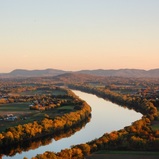 Shouldn't an issue like destruction of life on earth bring us together? A discussion of why politics of the oligarchy and corporatism is destroying us. A discussion of renewed hope and economic opportunity. How did We get Here To understand how we got to where we are when it comes to the discussion of climate change it is important to understand how we perceive our environment. Western perception of how we see ourselves in the greater world go back beyond the formation of modern consumerism, itself a movement of the 19th century as rural life transitioned to urban consumer life with industrialization. Matters of religion have also played a role. The idea of needing to cleanse oneself, to 'rise above' sin, to not give in to 'natural' temptations have over many centuries effected where we position ourselves in the environment. These ideas have largely positioned us against our environment. Political ideas like the American Manifest Destiny tied together a political and religious argument for conquering the natural world and any cultural groups who would stand in the way of 'progress'. A complex set of phenomenon, no less than the totality of human experience has brought us to where we are. Where we are is not where we want to be. The Moral Dilemma A moral argument behind climate change is being made on both sides. Those for recognizing the consequences of climate change realize that if in fact we adhere to a fundamental set of morals then the pain of one group of people caused by environmental degradation is the pain shared by us all. Climate change that destroys the Maldives should be a call to arms for the rest of us to change course. The opposite argument is being made by those who say sweeping changes to the way we do business, amass wealth, and provide the basics for our families should not be impeded for something which may not even exist. So who benefits given the real outcome? The argument needs to start where it's most personal. Most likely you wouldn't shit in your own living room. You also wouldn’t take some of your solid waste from a weekly trash collection, throw in a few chemicals you no longer need and deliver them promptly to your neighbor’s back yard. Why? It would be disrespectful to ourselves and to those immediately around us. Both scenarios may impede our personal or our neighbor's ability to live a healthy life, to grow food, to live in a politically and socially stable community. There is also somewhere deep within our conscious a voice that speaks to us. That voice says to do these things would be wrong. With this in mind, our ideas regulating personal behavior should encompass an ever-wider circle of people to include cultural groups, nations, and continents. So why do our efforts to protect our environment stop there? NIMBY to the Rescue We in the western world have become experts in externalization. We keep meat cheap by developing CAFOs. But the meat produced really isn't cheap. The cost is felt by all of us outside of the consumer price for that meat. The same goes for most of our food. The same for many of our consumer products. Same for most of the services we need and desire to offer to others in order to make a living. Who Benefits from the Course We're On? The reality is nobody on the planet benefits from climate change. But in a corporatized society an ever-smaller number of wealthy individuals can continue to externalize the issues, passing the buck on a growing number of impoverished individuals with little choice in the matter. In an oligarchy controlled by profit and profit only one can build walls around themselves to control their immediate environment...for a time. Sooner or later the hurricane will hit, the floods will devastate, the drought will destroy and long before that the peasants may revolt. An Argument for Change There is a moral obligation we have to each other and to ourselves to recognize climate change for what it is and take action collectively to make substantive improvements. There is also a credible argument backed by proof that the economics of climate change can be positive. Economic benefits from our attempts to mitigate climate change and conserve energy can have a positive effect through entrepreneurship across class and cultural boundaries. The opportunities for entrepreneurship in renewable energy, energy storage, water quality and distribution, agribusiness and social enterprise plus many more sectors present a real chance for millions of global partners to realize their personal and professional goals in a sustainable manner. New Businesses around the world most often lead by a new crop of social entrepreneurs who will teach the establishment a new way of doing business. In a country as polarized as the United States of America climate change should be a topic used to bind us together. Secularists and the religious, moralists and pragmatists, economists and idealists alike need air, water and a sustainable environmental cycle to survive. They also need economic opportunity and a renewed focus on moving forward as a political body, not stuck focusing on the past or on perpetuating economic and political systems that do not benefit the majority. Climate Change presents an opportunity for our working class and professional class to bind together in order to realize a new economic stream with opportunities for all, based on solid science and a moral code. Climate Change presents a unique moment; one where we can renew a social compact with each other. Without it, our present course of profit at all costs will end up destroying us in conflict. Without a dramatic change the only question will be by what means: armed conflict or environment disaster. Climate change presents a chance for hope. An opportunity for real change from the bottom up. A chance to re-think our place on the planet and how we interact with every other living being. Additional Resources TED Radio Hour Podcast 'The Hackers' 12.06.13 Scott Graves is passionate about helping business owners. Tune in to his podcast series 'No Boundaries Radio' on the No Boundaries Radio Network. Meet him at the crossroads between strategy and innovation at scott@smgravesassociates.com or twitter @smgcreative.
2 Comments
Leave a Reply. |
Scott M. GravesScott Graves and SMGraves Associates is responsible for the business model behind the Solaya O2E Advantage. Tune in to his podcast series 'No Boundaries Radio' on the No Boundaries Radio Network. Meet him at the crossroads between strategy and innovation at scott@smgravesassociates.com or twitter @smgcreative. ArchivesInvestor Relations
|
Solaya Energy LLC, Copyright © 2022


 RSS Feed
RSS Feed
